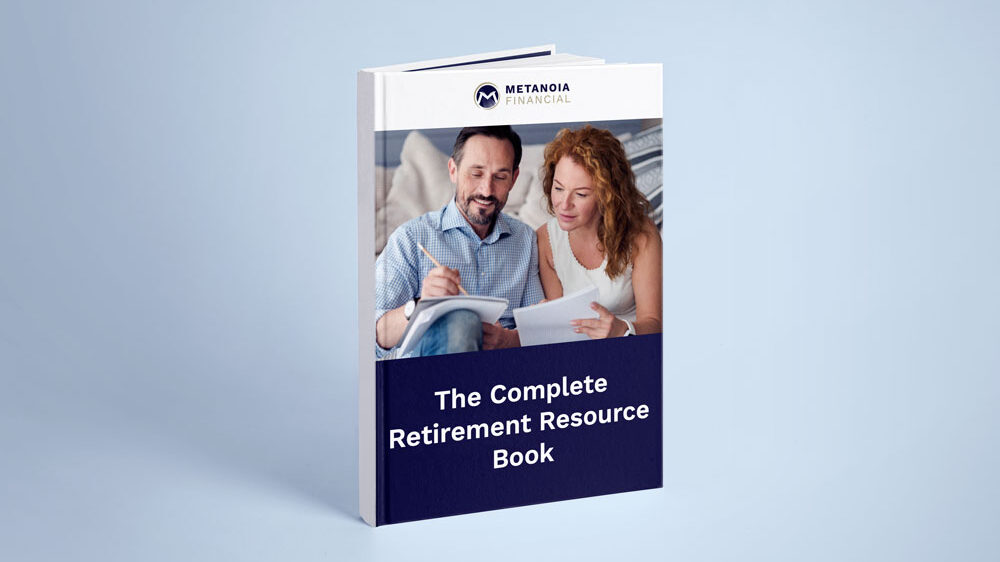What emotions go through your head when you think about retirement? For many people, retirement piques their anxiety. They’re all too aware that retirement is the biggest financial decision of their lives and they dread it with flashes of worry and regret.
And it’s not just naive individuals that feel this way; retirement intimidates savvy business professionals too. These people make wise decisions everyday, but retirement feels different. It’s uncharted territory — they have no training, no framework, no grounding. It’s no wonder a recent survey showed that 40% of Americans fear retirement more than death.
It does not have to be this way. You deserve to retire with confidence — enjoying freedom, dignity and independence long into your golden years. Picture a lifestyle where you do what you want when you want it. Imagine not just having enough money to get by, but the power to be extravagantly generous or transform your family tree.
You can have a great retirement.
It doesn’t come overnight and it doesn’t come without good planning. But with just a little help you can make the shift from anxiety to confidence.
In this article we help kickstart that transformation. This is a primer on everything you need to retire with confidence.
To get started keep reading or use the chapter links below to jump ahead.
Retirement Looks Different Than It Used To

Retirement is nerve-wracking because it looks so different than it used to.
The Challenges
People are living longer than ever before. While that’s incredibly good news, it also means that people may be retired for 20 years or more. To retire with confidence, you now need enough money to cover you into your 90s.
And unfortunately you won’t be able to rely on pensions like generations before you. In previous decades, employees worked for one company for much of their career and built up sizeable pensions — where your retirement is largely paid for by the company. But most employers have transitioned to 401(k)s and similar defined-contribution plans where the investment is mostly from your own money. The burden of saving for retirement — and the risk involved — now rests with you.
Social Security is also less of a safety net. With more people retiring and living longer, Social Security Funds are diminishing. This trend led Congress to raise the retirement age to 67 for retirees born after 1960. According to an annual government report, it is likely that the Social Security trust fund will run out of money in 12 years.
Throw in rising healthcare costs and retirement is more of a challenge than ever before.
The Blessings
But it’s not all doom and gloom.
Americans are now much healthier in their later years. That means people are able to enjoy active retirements. Many view retirement as an opportunity to try new things, explore new places or achieve long-harbored dreams.
For instance, many consider retiring abroad, traveling the country or volunteering.
And with increased technology over the past decades, individuals have more opportunities to save for retirement than ever before. Though sometimes overwhelming, there has been a steady “democratization” of information — you now have more options and more say in your retirement plan. All this means you can customize your retirement to your desires. That buys you freedom now, and, if done well, helps you retire with confidence in the long run.
Here are some links and references to check out:
The Softer Side of Retirement

We’ll continue to discuss the financial side of retirement, but there are some important things to consider first. Think for a moment about the softer side of retirement — the mental, emotional and spiritual gifts and challenges.
The gifts can be obvious. In retirement you won’t have to report to work and you’ll likely have more free time than you’ve had in years (though your schedule will fill up quickly!). This extra time can be a huge gift. Use it to pursue passions and spend time continuing to grow mentally and spiritually.
But it’s not all meditation and bliss either. For many, retirement can be disorienting. The thing that used to occupy so much of your time (work) is no longer there. In that vacuum, some people struggle to fill their time or face a scary sense of purposelessness. It often feels like retirement changes your identity and you have to discover who you want to be all over again.
It’s important to know these feelings are completely normal. They’re a part of such a dramatic transition.
But they don’t have to take over your life either. You can retire with confidence by thinking through these items ahead of time. Spend some time in prayer or talking with friends and family. What do you want your retirement to be about? How do you want it to look? And how can you begin preparing yourself for the emotional side of the transition now?
Check out these resources for more guidance:
How to Retire with Confidence

1. Plan Early
The earlier you can begin retirement planning the better. Not only does this give your investments the greatest amount of time to grow in the market, it also provides margin for adjusting your strategy.
2. Hire a Professional
Yes, financial advisors have fees. But the peace of mind they bring is well worth it. With a financial advisor you get a professional, skilled and experienced in this space. Retirement may be new to you, but they’ve walked dozens of people just like you through every step of the journey.
Hiring a retirement consultant also frees up your time. No one wants to spend all of their time worrying about and planning for retirement. If you hire a professional, you can outsource some of those worries to them and they’ll take care of your retirement plan so you can focus on enjoying your life now.
3. Know How Much Money You’ll Need
This is the most common question people ask: “how much money do I need to retire?” But even though people ask it all the time, only rarely do they arrive at a clear answer.
Retirement calculators can give you some insight, but your “golden number” will be unique to you. It will take into account not only your current assets, but the lifestyle you want to live. There are many questions and details that go into getting an accurate number, so we recommend consulting with a financial advisor.
4. Get Specific About When
Not everyone retires at 65. Sometimes it makes more sense to retire early, and other times it’s much better to delay retirement a few years.
Which option appeals most to you? Perhaps you’re ready to quit work wholesale and take off on a cross country trip. Or maybe you love your career (or want to start a new one) and would prefer to keep full- or part-time hours into your 70s.
Neither answer is inherently right or wrong. There are benefits and drawbacks to both. What matters is discovering what timeline makes the most sense for you — financially, physically, mentally and emotionally. Clarify your timeline and you’ll have a specific goal to work towards and base your portfolio around. Having that knowledge upfront makes it much easier to retire with confidence.
5. Invest Wisely
As we mentioned above, you can no longer count on a pension to pay for your retirement. It’s important that you invest wisely. This means exploring options like a 401(k) and maximizing contributions to IRAs.
A financial advisor can help you get much more specific here. They’ll determine the right asset allocation and can take the lead in managing your funds. Be sure to ask about diversification and rebalancing.
6. Consider a Spend-Down Plan
Many people talk about how much they need to save and invest to retire with confidence. Few get specific with their withdrawal or spend-down plan.
This is after you retire and are ready to start using the money you’ve accumulated over the years. And while it might seem simple, there’s actually many options and a lot of nuance. Talk with your financial advisor to map out how you’re going to withdraw money — how much, where from and when.
7. Review and Reassess Regularly
Much of the work needed to prepare for retirement will be done up front. The key is consistency and time in the market, so you won’t want to change your plan dramatically every other week.
But it is important to find regular times to review your progress. This may be a simple sit down with your financial advisor to see how your investments have performed over the last quarter. If everything looks good, you’ll be able to continue on course. If something in the market or your circumstances has changed, you may be able to discuss new opportunities.
Either way, regular check-ins will make sure everything is up to date. You’ll know for sure that your plan reflects your reality. And perhaps most importantly, you get regular assurance about where you stand. That means you’ll never have to guess and worry whether you’ll be okay. You’ll always know how close you are to your goals and what you can do to keep everything on schedule.
In our experience, that bit of clarity goes a long way to helping you retire with confidence.
10 Tips and Reminders to Retire with Confidence

- Avoid panicking. Retirement is an emotional thing, but emotional decisions are rarely good decisions. The right plan and partner can help you avoid anxiety.
- Consider how you’ll spend your time in retirement. This will help you plan your finances more accurately and beat post-retirement depression.
- Be mindful of taxes. Taxes often get lost in the planning process, but they greatly impact your investments and how you withdraw from them.
- Don’t get too fancy with your investments. Simple and consistent is usually a much better strategy.
- Keep your documents and numbers as organized as possible. This is the data that will inform your decisions.
- Be mindful of insurance. Medical bills increase with age. Proper planning will make sure they don’t derail your lifestyle.
- Estate planning is important. You’ll want to map out how your legacy will be cared for.
- Talk about how you’ll interact with children. No retiree wants to be a burden on their children, but neither should children become a burden on you. Be very clear about what you want to do should children or others look to you for loan or extra financial support.
- Think about where you want to retire. Your location will have a big impact on the cost of living and therefore how far your money can stretch.
- Look into life insurance policies. Life insurance policies can ensure your beneficiaries receive a substantial sum should something happen to you. And depending on the type of policy, they can be a great asset for you during retirement.
Resources to Retire with Confidence
In addition to the resources in this post, we put together a guide with dozens more helpful links and materials. We’ll happily send this over to your email.
How Are You Feeling Now?

With this post, we set out to minimize your anxiety and help you retire with confidence. But we also acknowledge that there’s a lot of information here and a lot of decisions to be made.
Retirement is a big thing — we don’t want to minimize that — but by working through the sections in this post, you’re already well on your way to getting it right. If you want help talking through any of the items above, or are ready to put a retirement plan in place, book a free consultation with Metanoia Financial. You deserve a stress free retirement. We’ll help you get it.







